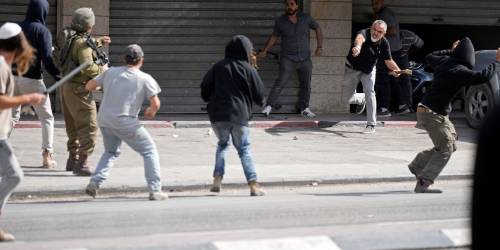|
The stakes of Israel’s November 1 election are ramping up, as Benjamin Netanyahu’s right-wing camp clashes with their political rivals over diplomacy with Lebanon and the rapidly deteriorating situation in the West Bank.
As the election campaign enters its critical final stretch, J Street’s Election Updates will continue to keep you up to date on everything you need to know about the state of the race.
|
|
Sparring Over New Diplomatic Agreement with Lebanon
|
|
 |
|
Last week, Israel successfully reached a diplomatic resolution of its long-running maritime dispute with Lebanon in the Mediterranean Sea. (Read J Street’s statement welcoming the agreement here.) The deal, reached by Prime Minister Lapid’s government with the proactive help of the Biden Administration, has become a target for Netanyahu as he grasps for lines of attack against Lapid.
The government approved sending the agreement to the Knesset for a two-week review. However, lawmakers will only be permitted to submit reservations about the agreement — not to vote on it formally. After the two-week review, it will go back to the Government Ministers for a final vote of approval, where it is expected to pass easily. “We have preserved Israel’s security interests, we are on our way to a historic agreement,” Prime Minister Lapid said of the deal.
Netanyahu, who has built much of his career around denigrating diplomacy, has vowed that if elected, he will not honor the agreement. He stated that, if elected he will treat the agreement, “as we have dealt with other bad agreements that we inherited from left-wing governments in the past” — a thinly-veiled reference to the Oslo Accords negotiated by Yitzhak Rabin, among other agreements.
|
|
While Violence Escalates in West Bank, Far-Right Extremists Gain Political Ground
|
|
 |
|
The extremely tense, deteriorating situation in the occupied West Bank could well have an impact on the final weeks of the election campaign — just as the election results and the shape of the next government will very likely impact the future of the occupation and the Israeli-Palestinian conflict.
In the past two weeks, two young IDF soldiers have been killed in shooting attacks. One violent rampage by settlers near the city of Nablus reportedly left 40 Palestinians wounded, while other instances of settler violence have been documented across the West Bank and in East Jerusalem. More than 100 Palestinians from the West Bank have been killed this year, the majority during intensive IDF operations in the West Bank — some of which followed on a string of terror attacks earlier in the year that killed 19 Israelis. The situation is nothing short of explosive.
If the right-wing bloc comes to power, things could very quickly become even worse — especially in light of the growing influence of the extreme-right, openly racist Jewish Power/Religious Zionism party, led by Kahanist politician Itamar Ben-Gvir and ultranationalist Bezalel Smotrich. While these figures and their movements formerly occupied the extreme fringes of Israeli politics, they have been normalized by Netanyahu and are now gaining ground in the polls. Netanyahu helped broker the two parties’ election merger — and reportedly met with Ben-Gvir last week to coordinate campaign and media strategy.
Last week, during clashes in the East Jerusalem neighborhood of Sheikh Jarrah, Ben-Gvir pulled out a gun and called on police to use live fire on Palestinians throwing stones — a night after threatening to “mow down” a group of Palestinians. Meanwhile, Smotrich has called for the Occupied Territory to become “one contiguous area of Jewish settlement within the sovereign Land Israel.”
If Likud forms the next coalition, the power and influence of its extremist and racist partners will be great and dangerous — and could also harm US-Israel relations, as several Democratic lawmakers and Jewish groups including J Street have warned.
|
|
High Court Rules Balad Can Run
|
|
 |
|
In late September, the Central Elections Committee disqualified the Arab-Israeli party Balad from running for the 25th Knesset, accepting a petition claiming the party’s platform denies the existence of the State of Israel.
Last week however, the Israeli High Court overturned that decision — with all nine justices ruling that the party is eligible for the ballot this year. “There is a shallow request here without evidence. The issue of disqualifying a party is too serious” for this sort of ruling, said one judge. Another judge added that “blocking the way of a party that represents a part of the Arab public in Israel may entail a harsh message against the equal citizenship of the Arab citizens of the country.”
This is far from the first time attempts have been made to prevent Balad and other Arab parties from running. As Haaretz’s Editorial Board wrote, “there is no Israeli election without a despicable attempt to disqualify the parties representing Arab voters in the Knesset.” In their ruling, the court noted that the petition to bar the party from running was even weaker than past similar petitions.
Balad is not currently expected to cross the 3.25% electoral threshold to enter the next Knesset. Its failure to do so could lead to the nullification of a significant number of Arab votes — an outcome that would make it easier for Netanyahu’s right-wing bloc to win a majority.
|
|
|
|
 |
|
For several weeks now, the polls have remained mostly stagnant.
The Netanyahu far-right alliance — which is made up of Netanyahu’s Likud, the ultra-Orthodox Shas party and United Torah Judaism alliance, hardline Religious Zionist Party, and the right-wing Jewish Home party — is consistently moving between 59 and 61 seats — with 61 being the magic number needed to form a coalition. The polls indicate that Netanyahu and his allies are close to the victory they seek — but it’s certainly not guaranteed.
At the same time, parties representing the rest of Israeli society beyond the center and far-right are facing significant challenges. The division among the Arab parties may very well lead to wasted votes, as many polls show both Balad and the Ra’am and Hadash-Ta’al alliance short of the needed 3.25% votes to enter the Knesset.
Meretz and Labor are in the same camp, with polls indicating that they are each also near the threshold. Observers worry that if any of these parties fail to make it into the Knesset, Netanyahu’s camp will have a clear path to forming the next government.
As the fall Jewish holiday season draws to a close, the final two weeks of the election are anticipated to be the most active time for campaigning. With so much at stake for Israel’s future, we’ll keep you posted on all the key developments between now and Election Day — and help you make sense of what has happened once all the votes have been cast.
|
|
|
|
|
|



